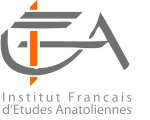NEWSLETTER MARS 2011
Newsletter mars 2011 Chers amis, Nous sommes ravis de pouvoir une nouvelle fois vous proposer un programme mensuel diversifié et de grande qualité. A l’honneur en mars Elisabeth Roudinesco est historienne de la psychanalyse. Elle a été l’élève de Gilles Deleuze et Michel de Certeau. Professeure au département d’Histoire de l’Université Paris VII-Denis Diderot elle est membre de l’École freudienne de Paris fondée par Jacques Lacan où elle a été formée. Son magistral ouvrage sur l’ Histoire de la Psychanalyse en France l’a fait connaître du grand public. Invitée ce moi-ci à Istanbul par l’IFEA, elle animera un atelier de travail et donnera deux conférences. Vous y êtes attendus et serez les bienvenus Nora Senihttp://ifea-istanbul.net Mars à l’IFEA *SéminairesSéminaire « La
